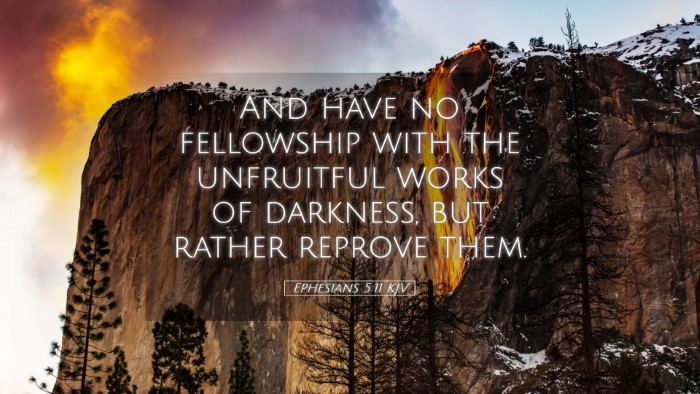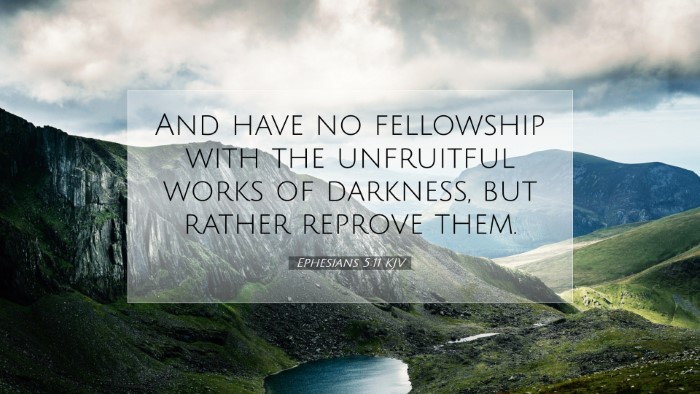Bible Commentary on Ephesians 5:11
Verse: "And have no fellowship with the unfruitful works of darkness, but rather reprove them." (Ephesians 5:11, KJV)
Introduction
Ephesians 5:11 serves as a vital exhortation for Christians to live in accordance with the teachings of Christ, emphasizing the necessity of distinguishing between light and darkness. Commentators such as Matthew Henry, Albert Barnes, and Adam Clarke provide profound insights into the implications of this verse, making it essential for pastors, students, theologians, and Bible scholars.
Contextual Background
Understanding the context of Ephesians is crucial. The Apostle Paul wrote this epistle to the church in Ephesus, addressing themes of unity, purity, and holiness. In the preceding verses, Paul contrasts the behaviors characteristic of the "children of light" against those of "children of disobedience". Ephesians 5:11 encapsulates this theme by urging Christians not to participate in immoral behaviors but rather to expose and confront them.
Key Insights from Commentaries
1. Matthew Henry's Perspective
Matthew Henry emphasizes the call to separation from "unfruitful works of darkness." He elaborates that light, symbolizing truth and holiness, naturally contrasts with darkness, which represents sin and ignorance. Henry suggests the following key points:
- Nature of Darkness: He describes the "works of darkness" as those actions that have no true substance or relevance to the kingdom of God, thus being "unfruitful."
- Christian Responsibility: Henry asserts that Christians are not to merely avoid these works but possess a proactive stance against them, enlightening others through reproof.
- Reproving vs. Reproaching: It is essential for believers to reprove with love and grace rather than condemnation, following Christ's example.
2. Albert Barnes' Commentary
Albert Barnes provides a practical application of this verse, emphasizing the implications for Christian living today. He notes:
- Fellowship in Ministry: Barnes highlights that while believers are called to engage with the world, they must not enter into fellowship with practices or ideologies that contradict God’s principles.
- Righteous Judgment: He points out that reproof is essential to maintaining the integrity of the church and to guide those in darkness toward the light, drawing from biblical examples.
- Fruitfulness of Light: Only through actively reproving darkness can believers hope to - as per the divine calling - produce 'fruit' that glorifies God.
3. Adam Clarke's Insight
Adam Clarke interprets this verse with an emphasis on the inner life of the believer. He conveys the following messages:
- Internal Light: Clarke stresses that Christians are transformed internally and therefore must reflect this change externally by refusing to engage in darkness.
- Active Engagement: He insists on the active role believers must play in rebuking sin, not simply by avoidance but by standing against injustice and immorality.
- Moral Obligation: Clarke admonishes believers regarding their moral obligations to call sin by its right name and be transparent in their interactions with both the secular and sacred aspects of life.
Theological Implications
This verse is rich with theological implications, serving as a reminder of the moral clarity that believers are called to embody. The kingdom of God is predicated upon light, life, and truth; thus, any engagement with darkness contradicts one's identity as a follower of Christ.
- Light vs. Darkness: The duality of light and darkness is a common biblical theme underscoring the struggle against sin. This verse therefore not only highlights personal holiness but emphasizes the communal responsibility of believers.
- Role of the Church: The church is positioned not merely as a sanctuary but as a beacon of light meant to confront and dispel darkness, thus calling the world to repentance.
- Ethics of Exposure: There is a call for ethical engagement that balances love with truth-telling, requiring discernment and sensitivity to the leading of the Holy Spirit.
Practical Applications for Today
Reflecting on Ephesians 5:11 offers several practical applications for contemporary Christians:
- Engagement in Society: Christians are encouraged to take a stand against social injustices and moral failings within society while exemplifying Christ's love.
- Fellowship Dynamics: Assessing relationships and communities for alignment with biblical values is essential for spiritual growth and purity.
- Mentorship and Teaching: Pastors and leaders are exhorted to teach congregants how to gently and lovingly reprove sin in their own lives and the lives of others.
- Personal Reflection: Daily self-examination and a commitment to holiness enable believers to shine brightly in a world often shrouded in darkness.
Conclusion
In conclusion, Ephesians 5:11 presents a powerful charge for believers to reject unfruitful works of darkness and to instead embrace their role as reflectors of Christ's light through both righteous living and faithful reproof. As illuminated through the teachings of prominent commentators, this verse challenges the church to remain vigilant in its pursuit of holiness and truth within a morally ambiguous culture.


